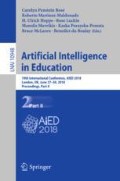Abstract
Research on mind-wandering, self-regulation and mindfulness have mostly been undertaken independently of each other with little attempt to examine direct relationships between them.
Access this chapter
Tax calculation will be finalised at checkout
Purchases are for personal use only
References
Bixler, R., D’Mello, S.: Automatic gaze-based user-independent detection of mind wandering during computerized reading. User Model. User Adap. Inter. 26(1), 33–68 (2015). https://doi.org/10.1007/s11257-015-9167-1
Brown, K., Ryan, R., Creswell, J.: Mindfulness: theoretical foundations and evidence for its salutary effects. Psychol. Inq. 18(4), 211–237 (2007)
Chalmers, D.: The puzzle of conscious experience. Sci. Am. 273(6), 80–86 (1995)
Drummond, J., Litman, D.: In the zone: towards detecting student zoning out using supervised machine learning. In: Aleven, V., Kay, J., Mostow, J. (eds.) ITS 2010, Part II, pp. 306–308. Springer, Heidelberg (2010). https://doi.org/10.1007/978-3-642-13437-1_53
Hutt, S., Mills, C., Bosch, N., Krasich, K., Brockmole, J., D’Mello, S.: Out of the Fr-Eye-ing pan: towards gaze-based models of attention during learning with technology in the classroom. In: 25th Conference on User Modeling, Adaptation and Personalization, pp. 94–103. Association for Computing Machinery, Bratislava (2017)
Kabat-Zinn, J.: Mindfulness-based interventions in context: past, present, and future. Clin. Psychol. Sci. Pract. 10(2), 144–156 (2003)
Killingsworth, M., Gilbert, D.: A wandering mind is an unhappy mind. Science 330(6006), 932 (2010)
Lamme, V.: Towards a true neural stance on consciousness. Trends Cogn. Sci. 10(11), 494–501 (2006)
Loftus, E.: Memories of things unseen. Curr. Dir. Psychol. Sci. 13(4), 145–147 (2004)
MacKenzie, M., Mezo, P., Francis, S.: A conceptual framework for understanding self-regulation in adults. New Ideas Psychol. 30(2), 155–165 (2012)
Matthews, G., Roberts, R., Zeidner, M.: TARGET ARTICLES: “Seven Myths About Emotional Intelligence”. Psychol. Inq. 15(3), 179–196 (2004)
Mooneyham, B., Schooler, J.: The cost and benefits of mind-wandering: a review. Can. J. Exp. Psychol. 67(1), 11–18 (2013)
Mrazek, M., Franklin, M., Phillips, D., Baird, B., Schooler, J.: Mindfulness training improves working memory capacity and GRE performance while reducing mind wandering. Psychol. Sci. 24(5), 776–781 (2013)
Porayska-Pomsta, K., Mavrikis, M., D’Mello, S., Conati, C., Baker, R.: Knowledge elicitation methods for affect modelling in education. Int. J. Artif. Intell. Educ. 22(3), 107–140 (2018)
Randall, J.: Mind wandering and self-directed learning: testing the efficacy of self-regulation interventions to reduce mind wandering and enhance online training performance. Ph.D., Rice University (2015)
Smallwood, J., Schooler, J.: The science of mind wandering: empirically navigating the stream of consciousness. Annu. Rev. Psychol. 66(1), 487–518 (2015)
Stewart, A., Bosch, N., Chen, H., Donnelly, P., D’Mello, S.: Where’s your mind at? Video-based mind wandering detection during film viewing. In: 2016 Conference on User Modeling Adaptation and Personalization, pp. 295–296. Association for Computing Machinery, Halifax (2016)
Wilson, T.: Strangers to Ourselves: Discovering the Adaptive Unconscious, 1st edn. Harvard University Press, Cambridge (2002)
Author information
Authors and Affiliations
Corresponding author
Editor information
Editors and Affiliations
Rights and permissions
Copyright information
© 2018 Springer International Publishing AG, part of Springer Nature
About this paper
Cite this paper
Cheung, W.K.D. (2018). Improving Self-regulation by Regulating Mind-Wandering Through the Practice of Mindfulness. In: Penstein Rosé, C., et al. Artificial Intelligence in Education. AIED 2018. Lecture Notes in Computer Science(), vol 10948. Springer, Cham. https://doi.org/10.1007/978-3-319-93846-2_93
Download citation
DOI: https://doi.org/10.1007/978-3-319-93846-2_93
Published:
Publisher Name: Springer, Cham
Print ISBN: 978-3-319-93845-5
Online ISBN: 978-3-319-93846-2
eBook Packages: Computer ScienceComputer Science (R0)

